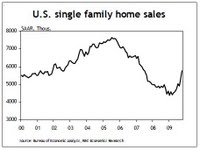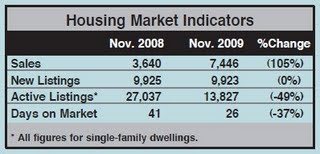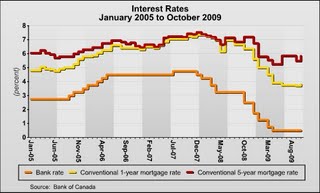This is the GTA and Country wide resale housing outlook according to TD/CT
Enjoy,
Mark
RESALE HOUSING OUTLOOK:
CANADIAN HOUSING LANDING SAFELY
While much more stable than its U.S. counterpart, the Canadian existing home
market has nonetheless gone through a wild ride over the last three years.
Sidestep-ping both worst-case scenarios of a bubble and crash, the resale market
appears to have landed safely, and somewhat earlier than we anticipated three
months ago. This begs the question of where the market is headed from here.
Looking out over the next two years, this piece updates our housing market
forecast from the one last published in our September Quarterly Economic Forecast.
The current year appears likely to turn in a performance near what we predicted in September, with annual national sales down slightly from last year. Meanwhile, with listings having seen less upside than anticipated, the annual average home price is set to gain around 7% in 2010.
The most important development since our September forecast is that in-creases in borrowing rates foreseen three months ago by TD Economics and most forecasters have been delayed, as uncertainty lingers and the U.S. Federal Reserve is engaging in a second round of quantitative easing. This translates into an improved home sales and average price forecast for next year. We have upgraded our national home sales forecast for 2011, though annual sales should still end up lower than in 2010. On the price front, in line with higher sales and a consequent but more modest uptick in listings, things look markedly better. We now forecast the annual average price for 2011 to remain essentially unchanged, slipping by less than 1%.
On the flipside, however, higher borrowing rates remain on the horizon, with the consequence that 2012 sales now look weaker than they did in September. In essence, with limited pent-up demand, higher sales activity in the near-term will likely rob from sales thereafter. In this context, the annual average price is likely to drop a bit further, by 1-2%. Rising interest rates will be the main headwind, but will occur against the backdrop of an improving economy. Along with contained increases in supply, continued but modest gains in income and employment should limit the extent to which homes depreciate.
Extreme fears miss the mark
In the midst of the global financial crisis which hit its apex in the fall of 2008, some worried that Canada might be in store for a U.S.-style housing crash. As we argued, that fear proved to be unfounded. The market experienced a severe downturn in 2008 during which time the average resale price dropped by 13% (peak-to-trough), but it rebounded in quick fashion. In July 2009, only six months after hitting bottom, the average price was already back to its pre-recession peak. Mortgage rates at record lows and lower prices set the stage for that unprecedented turnaround. By the end of 2009, the average price had climbed another 6%. As a result, concerns did a complete U-turn, shifting towards the risk that a hous-ing bubble was brewing.
Had the 2009 rebound been sustained for longer, we may well have agreed. But, as expected, it did not last. Sales peaked at year-end 2009, and the average price followed in April 2010. During the first half of this year, sales gave back most of their gains. This was consistent with our view that the 2009 rebound front-loaded activity and borrowed from future demand. Meanwhile, listings retreated and kept the market balance in check, preventing a steep price drop. As of the second half of this year, the market was already experiencing a nascent rebound.
Better rates, better sales - for now
As of October 2010, sales were up a cumulative 13% from July and the average price was on a modest uptrend. With mortgage rates dropping lower than initially expected, sales found their footing ahead of our September forecast - which had predicted a trough in the second quarter of 2011. The surprising decline in mortgage rates were the result of lower Government of Canada (GoC) bond yields, which anchor financial institutions' funding costs. For instance, the benchmark 5-year GoC bond yield was near 2% in late October, which translated into an average posted 5-year fixed mortgage rate near 5% - with effective (i.e. negotiated) rates closer to a historical low 3.5%.
As a result, home affordability in Q3 saw its first im-provement since early 2010. In turn, demand improved. The recent uptick in sales does not appear to be a blip, par-ticularly in light of its regional breadth. There appears to be more at play, for instance, than volatility related to sales tax harmonization in B.C. and Ontario.
Rates in the driver's seat
If anything, the housing market's gyrations over the last three years confirm the great sensitivity of demand to mortgage rates. While other drivers such as income and em-ployment obviously matter, crunching the numbers reveals that they do not weigh in nearly as much as lending rates do. As such, great attention should be paid to where interest rates are headed. What's more, our forecast for income and employment over the next two years is of the uneventful variety - one of continued but modest growth. In essence, income and employment should grow sufficiently to put a floor under demand, but not so strongly as to sharply tilt the market balance in favour of sellers.
Higher rates still on the horizon
Looking ahead, we would caution that the main driver behind our September view that home sales would continue to head lower has not been eliminated, but simply postponed - higher interest rates remain on the horizon. By the same token, the magnitude of increases is expected to be limited. The Bank of Canada's overnight rate is expected to be on hold at 1% until the second half of next year before reaching 2% by year-end 2011, and 3% by year-end 2012.
The overnight rate anchors bank's prime lending rate and variable rate mortgages. Longer-term rates such as a typical 5-year fixed rate mortgage are anchored around 5-year Go Cbond yields. On that front, we forecast a rise of about one percentage point between year-end 2010 and year-end 2011, and a further half percentage point by year-end 2012. Hence, beyond the first half of 2011, we expect both short-term and longer-term interest rates to rise modestly in tandem. <p>Thus, interest rates will tend to erode
home affordability over the next two years - although other factors, such as continued income growth, will soften the blow. Moreover, home affordability starts in a good position, with the typi-cal mortgage consuming 28.5% of the average household income as of Q3/2010. This provides continued near-term support for sales, but only up to the point where rising inter-est rates and sticky prices begin to impair the affordability picture. Over the next two years, our home affordability measure is expected to range between 30% and 32%. In historical terms, this is a manageable erosion in affordability compared to 40% and higher observed in the late 1980s.
Stability is the word
The net result is that home sales can stay elevated for another couple of quarters, but should begin to moderate thereafter. Part of what lies behind the retracement in home sales has been the outsized contribution of first-time homebuyers during the market rebound.
Having no built-up equity or capital gains to fall back on, these buyers are more sensitive to changes in affordability - monthly mortgage payments as percentage of income - stemming from inter-est rate changes than existing homeowners. For potential future first-timers, a slight change in borrowing rates can mean the crucial difference between an entry-level purchase and being priced out altogether. They led the resurgence in sales and prices in 2009, but look set for a role reversal as interest rates eventually begin their inevitable trek upwards.
As sales flatten out and start to slow over the course of 2011, and with listings expected to stay contained, we expect prices to find a near-term ceiling over the next few quarters. Subsequently, a softer market balance will likely result in a modest price drop of 3-5% (peak-to-trough) in late 2011 and early 2012 before prices stabilize later in the year. All said, the higher interest rate trend fortunately starts as the Canadian housing market is well balanced between listings and sales. This balance does not support suggestions that prices should either surge or suffer a steep correction. This is likely to be a modest market adjustment driven by higher borrowing rates, but cushioned by an improving economy. 2010 was not what bubbles are made of. Similarly, under our forecast interest rate profile, the next two years will not be what crashes are made of.
I hope this finds you Happy and Healthy!
All the Best!
Mark
A. Mark Argentino
P. Eng. Broker
Specializing in Residential & Investment Real Estate
RE/MAX Realty Specialists Inc.
Providing Full-Time Professional Real Estate Services since 1987
BUS 905-828-3434
FAX 905-828-2829 CELL 416-520-1577
mark@mississauga4sale.com
Mississauga4Sale.com
* Thinking of selling your home in the next 3 to 6 months? Would you
like a Complimentary & Quick Over-The-Net Home Evaluation ?
www.mississauga4sale.com/internet-evaluation.htm
* Power of Sales and Foreclosures
www.mississauga4sale.com/Power-Sales-Bank-Sales-Alert-Request.htm
* If you have not already signed up to receive my monthly real estate
newsletter, you may do so here: On-Line Real Estate Newsletter sign up
www.mississauga4sale.com/popupquestion.htm
* See seasonal housing patterns
www.mississauga4sale.com/TREBprice.htm
* Would you like me to send you a desk or wall Calendar?
www.mississauga4sale.com/Calendar-Order-Form.htm

















